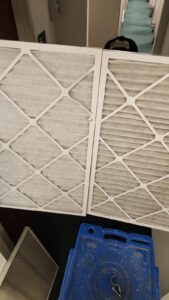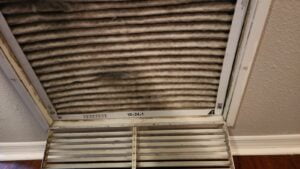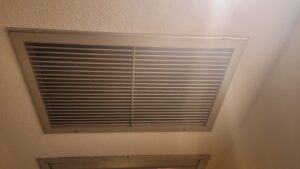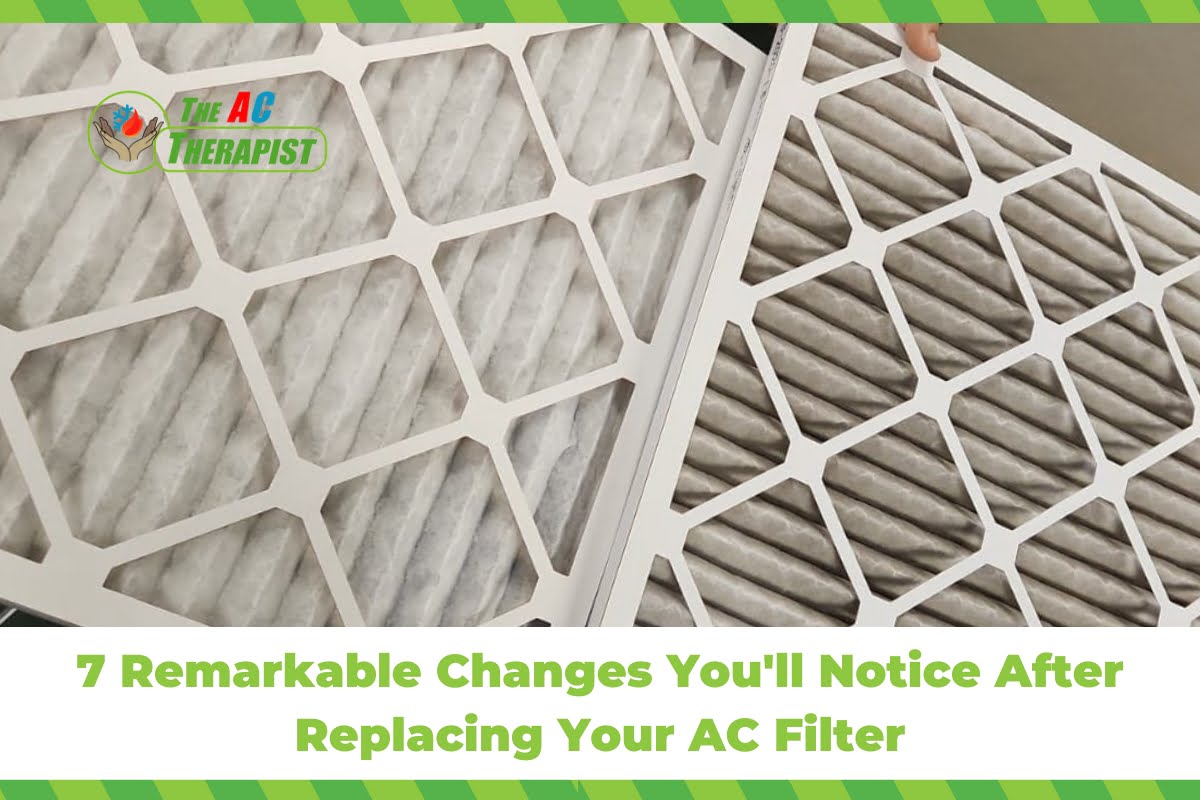7 Remarkable Changes You’ll Notice After Replacing Your AC Filter
In the sweltering heat of summer or the unexpected chill of winter, your air conditioning (AC) system is the unsung hero of home comfort. However, like any hero, it needs the right support to perform at its best. This support comes in the form of a simple, often overlooked component: the AC filter. In this comprehensive guide, we’ll explore the transformative effects of replacing your AC filter, diving into the before and after scenarios that every homeowner should know.
The Importance of AC Filters
Air conditioning (AC) filters are a critical component of your home’s HVAC system, yet they are often one of the most underappreciated. These filters serve a dual purpose: they protect the AC unit and improve the air quality inside your home. Understanding the importance of AC filters is key to maintaining a healthy, efficient, and comfortable living environment, especially in areas like the Tampa Bay region where AC usage is high due to the warm climate.
1. Protecting the AC System
The primary function of an AC filter is to protect the internal components of the air conditioning unit. As air circulates through the system, it carries with it various particles, including dust, pet dander, pollen, and other airborne contaminants. The filter traps these particles, preventing them from entering the AC unit. This is crucial because the accumulation of debris inside the AC can lead to several problems, such as:
- Reduced Efficiency: When filters are clogged, the AC unit must work harder to circulate air. This not only increases energy consumption but also reduces the overall efficiency of the system.
- Increased Wear and Tear: Excessive strain on the AC unit due to clogged filters can accelerate wear and tear, leading to more frequent repairs and potentially shortening the lifespan of the unit.
2. Improving Indoor Air Quality
The second key role of AC filters is to improve the indoor air quality of your home. This aspect is particularly important for families with members suffering from allergies, asthma, or other respiratory issues. A clean AC filter:
- Traps Allergens: Filters capture a significant amount of the allergens that can cause respiratory discomfort, such as pollen, dust mites, and pet dander.
- Reduces Dust Accumulation: Regularly changing the AC filter can noticeably reduce the amount of dust that settles around your home, making for a cleaner living environment.
- Helps Eliminate Odors: Some filters are designed to absorb odors and volatile organic compounds (VOCs), thereby freshening the air in your home.
3. Cost-Effectiveness
Maintaining a clean AC filter can also be seen as a cost-effective practice. By ensuring that your AC unit operates efficiently, you can save on energy costs. A well-maintained system uses less energy to cool or heat your home, which translates to lower utility bills. Additionally, by reducing the wear and tear on your AC unit, you extend its lifespan, delaying the need for expensive repairs or replacement.
4. Supporting Overall Comfort
Lastly, AC filters contribute significantly to the overall comfort of your home. A well-functioning AC system with a clean filter better regulates temperature, maintains consistent airflow, and reduces humidity levels. This creates a more comfortable and pleasant living environment, especially during extreme weather conditions.

Before Filter Replacement
Understanding the state of your home and air conditioning (AC) system before replacing an AC filter is crucial. This knowledge not only highlights the importance of regular maintenance but also helps in recognizing the signs that it’s time for a filter change. Here are some common scenarios and issues that can arise when an AC filter is due for replacement, especially in environments like the Tampa Bay area where AC systems are frequently used.
1. Reduced Air Quality
One of the first signs that your AC filter needs changing is a noticeable decline in indoor air quality. This can manifest in several ways:
- Increased Dust: You might start to notice more dust accumulating on surfaces around your home. This is often due to the filter being too clogged to trap particles effectively.
- Aggravated Allergy Symptoms: For individuals with allergies, an old filter can mean more allergens like pollen and pet dander circulating in the air, leading to increased symptoms.
- Musty Odors: A dirty filter can trap and hold moisture, potentially leading to mildew or mold growth, which can cause musty smells.
2. Decreased AC Efficiency
A clogged or dirty filter restricts airflow, forcing the AC system to work harder to circulate air. This inefficiency can lead to several issues:
- Higher Energy Bills: The harder your AC system works, the more energy it consumes, leading to a noticeable increase in your utility bills.
- Inadequate Cooling or Heating: You might find that your home doesn’t reach the desired temperature, or it takes longer to do so, indicating restricted airflow due to a dirty filter.
3. Uneven Temperature Distribution
When an AC filter is clogged, it can lead to uneven distribution of air. This results in:
- Hot or Cold Spots: Certain areas of your home may feel warmer or cooler than others, as the AC struggles to distribute air evenly.
- Fluctuating Temperatures: You might notice frequent temperature changes, as the system can’t maintain a consistent airflow.
4. Increased Wear and Tear
A dirty filter puts additional strain on your AC system, leading to more than just discomfort:
- Frequent Repairs: Components of the AC, like the blower motor, may wear out more quickly due to the extra strain, leading to more frequent repairs.
- Shortened AC Lifespan: Over time, the increased wear and tear can shorten the overall lifespan of your AC unit, resulting in the need for an earlier replacement.
5. Visible Dirt and Clogging
In some cases, you can physically see that the filter is dirty:
- Visible Dust and Debris: The filter may appear grey or blackened, and you might be able to see dust and debris accumulated on it.
- Filter Material Damage: In extreme cases, the filter material might look damaged or deformed, a clear sign it needs immediate replacement.

The Process of Changing an AC Filter
Changing an AC filter is a crucial maintenance task that can lead to significant changes in your system’s efficiency and the overall air quality of your home. Understanding the process of changing your AC filter is essential, as regular changes can prevent a multitude of issues. Here’s a step-by-step guide to ensure you make these changes effectively:
1. Identify When a Change is Needed
Before you start the physical process of changing your filter, it’s important to recognize when changes are necessary. Typically, AC filters should be changed every 30-90 days, but this can vary based on factors like usage, filter type, and environmental conditions. Regular checks will help you determine when changes are due.
2. Selecting the Right Filter
Not all filters are created equal, and choosing the right one can make significant changes in your AC’s performance. Consider the size, type, and MERV (Minimum Efficiency Reporting Value) rating of the filter. Higher MERV ratings can filter out smaller particles, which is a crucial consideration for those needing changes due to allergies or respiratory issues.
3. Preparing for the Change
Before making any changes, ensure your AC unit is turned off to avoid any safety hazards. This is a simple but crucial step in the process of changing your filter.
4. Removing the Old Filter
Locate your AC filter, which is typically found in the return air duct or in a slot on the side, bottom, or top of your AC unit. Slide out the old filter and check it for any signs of excessive dirt or damage – this can indicate that changes were overdue.
5. Inserting the New Filter
When making changes to your AC filter, it’s vital to ensure that the new filter is oriented correctly. Most filters will have an arrow indicating the proper airflow direction. This arrow should always point towards the AC unit, away from the return air duct.
6. Secure the Filter in Place
Once the new filter is correctly positioned, make sure it fits snugly in place. Improper installation can lead to air bypassing the filter, negating the positive changes you’re trying to achieve.
7. Dispose of the Old Filter
After the changes are made, dispose of the old filter properly. Most filters can be thrown away with your regular household waste, but check if there are any specific disposal requirements for your filter type.
8. Record the Date of Change
Keeping track of when changes are made can help you maintain a regular schedule. This is important for ensuring that the changes you make have a lasting positive impact on your AC system and air quality.
9. Monitor and Repeat
Finally, after making these changes, monitor your AC system’s performance. If you notice positive changes in air quality and system efficiency, it means the filter change was successful. Remember, regular changes are key to maintaining these benefits.

After Filter Replacement
Replacing an AC filter is a simple yet impactful maintenance task that brings about significant changes in your air conditioning system’s performance and the indoor air quality of your home. Understanding the changes that occur after a filter replacement can help you appreciate the importance of this routine task. Here are some of the key changes you can expect after replacing your AC filter:
1. Improved Air Quality
One of the most immediate changes you’ll notice is in the air quality of your home. A new filter efficiently traps dust, pollen, pet dander, and other airborne particles, significantly reducing allergens and pollutants in the air. This change is particularly beneficial for individuals with allergies or respiratory issues, as cleaner air can lead to fewer symptoms and a healthier living environment.
2. Enhanced System Efficiency
After the filter change, another significant change is the improvement in your AC system’s efficiency. A clean filter allows for better airflow, reducing the strain on your AC unit. This change means the system doesn’t have to work as hard to circulate air, leading to lower energy consumption and reduced utility bills. Over time, these changes can add up to substantial savings.
3. Consistent and Improved Airflow
Changes in airflow are also noticeable after a filter replacement. With a clean filter, air can move freely through your AC system, eliminating issues like hot or cold spots in different areas of your home. This change results in more consistent and comfortable indoor temperatures, enhancing the overall comfort of your living space.
4. Extended Lifespan of the AC Unit
Regular filter changes can lead to a longer lifespan for your AC unit. When the filter is clean, there’s less wear and tear on the system’s components, as they don’t have to work as hard to push air through. This change can save you money in the long run by delaying the need for costly repairs or replacements.
5. Reduction in Humidity Levels
In areas with high humidity, like the Tampa Bay region, changes in humidity levels inside the home are a significant concern. A new AC filter can help the system regulate humidity more effectively, leading to a more comfortable indoor environment. This change is particularly important during the hot and humid summer months.
6. Decrease in Noise Levels
Another change you might notice is a reduction in noise from your AC unit. A clogged filter can cause the system to strain and produce more noise. After a filter change, the system runs more smoothly and quietly, contributing to a more peaceful home environment.
7. Positive Environmental Impact
Lastly, the changes brought about by regular filter replacements have a positive impact on the environment. Improved efficiency means less energy consumption, which is beneficial for the environment. This change, while seemingly small on an individual level, can contribute significantly to energy conservation efforts when adopted widely.

Additional Benefits and Maintenance Tips
Regularly changing your AC filter is a simple yet essential aspect of maintaining your HVAC system. Beyond the immediate changes in air quality and system efficiency, there are additional benefits that come with this practice. Understanding these benefits and following key maintenance tips can lead to lasting positive changes in your home environment and HVAC system performance.
Additional Benefits of Regular Filter Changes
- Cost Savings: One of the most significant changes brought about by regular filter changes is cost savings. A clean filter means your AC unit doesn’t have to work as hard, leading to lower energy bills. Over time, these savings can be substantial.
- Healthier Living Environment: Regular filter changes can lead to a healthier living environment. By removing contaminants from the air, these changes can reduce the risk of health issues related to poor air quality, such as asthma attacks and allergic reactions.
- Improved System Reliability: Frequent filter changes can improve the reliability of your HVAC system. This change means fewer breakdowns and disruptions, ensuring your home remains comfortable throughout the year.
Maintenance Tips for Optimal Performance
- Regular Filter Checks and Changes: Check your AC filter monthly, especially during high-use seasons like summer and winter. The frequency of changes can depend on several factors, including the type of filter, the presence of pets, and the level of pollution in your area.
- Choosing the Right Filter: Not all filters are the same. When making changes, choose a filter that suits your specific needs. Consider factors like filter thickness, material, and MERV rating. Higher MERV ratings can filter out smaller particles, which is crucial for homes in areas with high air pollution or for families with allergy sufferers.
- Professional Maintenance: Besides regular filter changes, annual or bi-annual professional maintenance can lead to significant changes in your system’s performance. Technicians can identify and address issues that aren’t visible to the untrained eye.
- Sealing and Insulation: Ensure that your home is properly sealed and insulated. These changes can reduce the workload on your HVAC system, thereby enhancing its efficiency and longevity.
- Mindful Usage: Be mindful of how you use your HVAC system. Simple changes like adjusting the thermostat when you’re not home and using ceiling fans can reduce the strain on your system.
- Educating Household Members: Educate everyone in your home about the importance of HVAC maintenance. Simple changes in behavior, like ensuring vents are not blocked by furniture, can improve system performance.
- Keeping the Area Around the Unit Clean: Regularly clean around the indoor and outdoor units. These changes can prevent dust and debris from entering the system and clogging the filter.
Breathe Easy: The Remarkable Before and After of AC Filter Replacement with The AC Therapist
In conclusion, the journey from the ‘before’ to the ‘after’ of an AC filter replacement is one filled with significant and beneficial changes. As we have explored, these changes extend far beyond just improved airflow or reduced energy costs. They encompass a holistic enhancement of your home’s air quality, the efficiency and longevity of your HVAC system, and the overall comfort and health of your living environment.
At The AC Therapist, we understand the critical role that such a simple maintenance task plays in the grander scheme of your home’s well-being. Regular filter changes are not just a recommendation; they are a cornerstone of responsible and effective home management. By staying vigilant about these changes, you ensure that your home remains a sanctuary of comfort and health, regardless of the season.
We encourage you to embrace these changes and make regular AC filter replacements a part of your routine home maintenance. Remember, The AC Therapist is always here to assist you with expert advice, professional services, and comprehensive solutions for all your HVAC needs. Together, let’s ensure that the air you breathe is as clean, comfortable, and healthy as it can be, reflecting the remarkable transformation that comes with a simple change of your AC filter.








